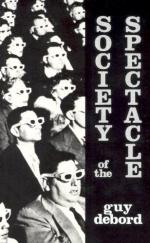
|
| Name: _________________________ | Period: ___________________ |
This test consists of 15 multiple choice questions and 5 short answer questions.
Multiple Choice Questions
1. According to thesis 44, the spectacle is a permanent _________ war.
(a) Consumer.
(b) World.
(c) Opium.
(d) Theoretical.
2. In thesis 35, the commodity abounds in ____________subtleties.
(a) Fantastical.
(b) Mythological.
(c) Metaphysical.
(d) Quantum.
3. Debord sees Marxist theory as what?
(a) Historic.
(b) Philosophic.
(c) Scientific.
(d) Innovative.
4. In thesis 3, the spectacle serves as a means of what in society?
(a) Division.
(b) Education.
(c) Unification.
(d) Religion.
5. The economy's __________ as an independent power also spells its doom, according to Debord.
(a) Perception.
(b) Pinnacle.
(c) Triumph.
(d) Truth.
6. The spectacle in thesis 4 is described as what?
(a) A monster.
(b) A social relationship.
(c) A foe.
(d) A political system.
7. What role does Debord believe money plays in commodity?
(a) Counselor.
(b) Lifeguard.
(c) Emissary.
(d) Diplomat.
8. What does Debord believe is the chief mechanism for passing on class power?
(a) Wealth.
(b) Governments.
(c) Rules.
(d) Family.
9. To Marx, the __________ was more important than the law.
(a) Power.
(b) Wealth.
(c) Freedom.
(d) Struggle.
10. What does Debord say every Chinese person must study?
(a) Marx.
(b) Mao.
(c) Confucius.
(d) Socialism.
11. In order to succeed, Debord says revolutionary theory must reject what?
(a) Socialism.
(b) Communism.
(c) Revolutionary ideology.
(d) Spectacular seduction.
12. In thesis 13, the spectacle is essentially what?
(a) Symantic.
(b) Tautological.
(c) Systematic.
(d) Illogical.
13. According to thesis 21, what is a social necessity?
(a) Loving.
(b) Learning.
(c) Dreaming.
(d) Respecting.
14. In thesis 16, Debord refers to the spectacle as a what?
(a) Mirror.
(b) Lake.
(c) Plague.
(d) Train.
15. The spectacle is quintessentially dogmatic, yet produces no solid _______, in Chapter 3.
(a) Dogma.
(b) Leader.
(c) Reality.
(d) Truth.
Short Answer Questions
1. What did Hegel interpret according to Chapter 4?
2. Debord believes the origin of the spectacle lies in the world's loss of what?
3. In Chapter 3, the spectacle is the epic strife that no fall of ______ can bring to an end.
4. What does Debord believes lies behind the glitter of the spectacle's distractions?
5. Fads make the commodity more and more what, according to Debord?
|
This section contains 297 words (approx. 1 page at 300 words per page) |

|




